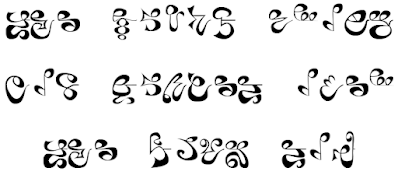What's in a Name?
 Since I was a child, foreign languages (and foreign alphabets) have fascinated me. I'm almost certain that my fascination was a direct result of my having spent untold hours staring at the endpapers and appendices of the
Random House Dictionary of the English Language
that detailed the evolution of various writing systems and the relationships between Indo-European languages. Though I've never mastered any language other than English, I've formally studied a bunch of them, which has only strengthened my interest in tongues other than my own. Reading The Lord of the Rings probably played a role, too.
Since I was a child, foreign languages (and foreign alphabets) have fascinated me. I'm almost certain that my fascination was a direct result of my having spent untold hours staring at the endpapers and appendices of the
Random House Dictionary of the English Language
that detailed the evolution of various writing systems and the relationships between Indo-European languages. Though I've never mastered any language other than English, I've formally studied a bunch of them, which has only strengthened my interest in tongues other than my own. Reading The Lord of the Rings probably played a role, too.My fascination with languages inevitably carried over into my roleplaying games. Almost from the moment I discovered Dungeons & Dragons, I started creating riddles, puzzles, ciphers, and codes that depended on obscure, esoteric, and/or foreign words. I thought I was being clever, though, judging from the reactions of my friends, they weren't nearly as pleased with my brilliance as I was. Undeterred, I moved on to creating my own languages, complete with their own grammars and vocabularies, hoping that my players would want to make use of them in our games. Alas, outside of coming up with appropriate sounding names for characters and locations for my campaign setting, this rarely happened.
I think names are important. Having good, evocative names helps to lend a sense of place to an adventure or campaign, especially if they're meant to be something other than a generic fantasyland or galactic empire. One of my problems with a lot of RPG settings is that the frequently don't have good names, quite the opposite, in fact. Bad names – or even unimaginative names – take me out of a setting or adventure, which can lessen my enjoyment of them. I realize that not every roleplayer cares about such things, but, for me, they're important. A big part of my enjoyment of roleplaying comes from exploring an imaginary world and, in my opinion, good worlds have good names.
As a setting, Tékumel is well known for its use of constructed languages, most notably Tsolyáni, the language of the titular Empire of the Petal Throne. Everything in the setting, from monsters to gods to even coinage and units of measurement have unique names derived from Tsolyáni or another imaginary language. For someone like myself, that's a huge boon to immersion. However, I know plenty of gamers who are actually put off by it. They don't like having to wrestle with words like Ngóro or Dlamélish or Mu'ugalavyá when playing an RPG. Sure, words like these are more suggestive of a real world with a real culture of its own, but, if they get in the way of actually playing, then what's the point of including them?
This is something I think about a lot. Since I've lately been writing a bit more about Thousand Suns , I'm reminded of the fact that, in that game, I make use of the constructed international auxiliary language Esperanto. I did that for a number of reasons, though one of the main ones was that a number of sci-fi books that inspired me, like Harry Harrison's "Stainless Steel Rat" series, for example, used Esperanto as the universal language of mankind. So, in Thousand Suns, I use Esperanto words and names in place of more common English ones as a way to add flavor to the game's meta-setting. I don't expect anyone to actually speak Esperanto while playing any more than anyone is expected to speak Tsolyáni while playing Empire of the Petal Throne. Even so, I've occasionally got complaints about the use Esperanto and its peculiar orthography (e.g. ĉ instead of ch or ĝ instead of j).
I've been pretty upfront about the fact that Tékumel was a big influence on me as I developed the setting of Secrets of sha-Arthan . One way that Tékumel has definitely influenced me is the use of unfamiliar, non-English words for people, places, and creatures within the setting. I really like the way these words have helped me to get a stronger handle on the various cultures that exist in sha-Arthan and how they relate to one another, but, as with Tékumel, I can easily imagine that someone not as keen on the use of odd words might find them an impediment rather than an aid to their enjoyment of Secrets of sha-Arthan.
It's a tough line to walk. My own interests and inclinations are to indulge my own love of exotic words, even if it's discouraging to some potential players. At the same time, one of my goals with both Thousand Suns and Secrets of sha-Arthan is to present something that were more easily accessible than the games and books that inspired them. Consequently, I'm constantly second guessing myself when it comes to how hard to lean into idiosyncratic nomenclature. I'd appreciate hearing your thoughts about this topic, especially if you can point to your experiences with games/books that either succeeded or failed to make use of peculiar names and words to help build a unique setting.

Published on January 26, 2025 21:00
No comments have been added yet.
James Maliszewski's Blog
- James Maliszewski's profile
- 3 followers
James Maliszewski isn't a Goodreads Author
(yet),
but they
do have a blog,
so here are some recent posts imported from
their feed.



